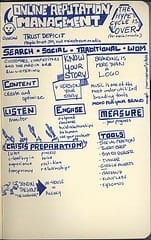
Researchers show reputation concerns can encourage people to take part in real world ‘public-good’ programs
Whether it’s an effort to increase recycling rates, reduce energy usage or cut carbon emissions, the conventional wisdom says that the best way to get people to do the right thing is to make it worth their while with cold, hard cash.
But Harvard researchers say there may be an easier, cheaper way – by appealing to people’s reputation, not their wallets.
Using enrollment of thousands of people in a California blackout prevention program as an experimental test bed, a team of researchers that included Erez Yoeli, a researcher at the Federal Trade Commission, Moshe Hoffman, a visiting researcher at Harvard’s Program for Evolutionary Dynamics (PED), David Rand, formerly a post-doctoral fellow at PED (now a professor at Yale University), and PED Director Martin Nowak, showed that while financial incentives boosted participation only slightly, making participation in the program observable – through the use of sign-up sheets posted in apartment buildings – produced a three-fold increase in sign-ups. Their work is described in a study published this week in the Proceedings of the National Academy of Sciences.
“We wanted to see how observability compares to a cash incentive for getting people to act to benefit the common good. The answer is that observability is really dramatically better,” Rand said.
Using a cash incentive of $25, the utility company sponsoring the program had seen participation increase from about three percent to four percent. When researchers made people’s participation observable, however, participation jumped from three to nine percent. To get the same result using a cash incentive, Yoeli estimated, the company may have had to offer every person as much as $175.
Observability proved to be the key factor in the results, the researchers said, because it puts people’s reputation at stake, encouraging those who might not otherwise sign up to do so.
“When people know it’s a cooperative effort, they feel peer pressure to take part,” Rand explained. “They think, ‘If I don’t do this, I’m going to look like a jerk.’ But if it’s not observable, then there’s no problem with not participating.”
“In fact, we think this is one reason why the Prius, for instance, is such a different-looking car,” said Hoffman. “The designers at Toyota seem to have intuitively had this idea, designing a car that didn’t look like any other car so your neighbors can tell you’re driving a hybrid.
“You can also see this phenomenon when you go to vote, and you get an ‘I voted’ sticker,” he added. “Or when you go to give blood and you get a pin you can put on your backpack.”
To directly demonstrate the effect of observability in a highly relevant real world setting, Yoeli and colleagues turned to a large-scale California blackout prevention program. As part of the program, residents were asked for permission to install a monitoring device on their air-conditioning system. If power demand spiked, the device would automatically adjust the air-conditioning temperature to reduce electricity demand and not overload the power grid.
As part of their study, researchers randomly offered people one of two ways to sign up for the program.
In the first, people received a mailer that described the program, and were encouraged to sign up in their apartment building using a unique identification number. In the second, people received a similar mailer and identification number, but also had to write their name and apartment number when they signed up.
“The idea was that in one case, it’s anonymous, and in the other, it’s observable – everyone can see who has and hasn’t signed up,” Rand said. “When participation is observable, people worry about their reputation, and wanting to seem cooperative drives them to sign up.”
The Latest Bing News on:
Reputation
- New president Benoit-Antoine Bacon praises UBC's growing reputation as biotech hubon May 7, 2024 at 4:23 pm
UBC’s new president, Benoit-Antoine Bacon, says B.C.’s largest university has an exciting future, given the city’s growing reputation as a biotech hub and new federal funding for life-science research ...
- Why Ron Howard's ‘Nice' Reputation Is So Fitting (Guest Column)on May 7, 2024 at 11:20 am
Ron Howard has been part of our collective consciousness for as long as I can remember. Or at least he looms large in mine. Born in 1954, he was on many of the TV series I grew up watching and had his ...
- Google: Site Reputation Abuse Manual Actionson May 7, 2024 at 10:56 am
Google's SearchLiaison confirmed that the site reputation abuse policy enforcement "is really kicking off today" ...
- France tries to shed its rude reputation ahead of the Olympicson May 7, 2024 at 7:35 am
Are Parisians really unfriendly to tourists? A resident goes undercover to find out as the city tries to shed its rude reputation before the Olympics.
- Marvel announces new tactic that could improve reputationon May 7, 2024 at 4:25 am
Disney CEO Bob Iger has announced the company’s plans to slowly reduce the amount of Marvel Cinematic Universe (MCU) films and TV shows it releases annually. Last year, Marvel saw nearly all of its ...
- Julen Lopetegui has a reputation for friction – but West Ham believe he is worth the riskon May 6, 2024 at 11:41 pm
Lopetegui has vast experience and a reputation for improving teams. He is a Europa League winner with Sevilla and has managed Spain and Real Madrid. His achievements at Wolves deserve closer scrutiny ...
- Google begins enforcement of site reputation abuse policy with portions of sites being delistedon May 6, 2024 at 5:15 pm
Sites like CNN, USA Today, LA Times and others are seeing their rented subdomains and subfolders dropping out of the Google Search index tonight.
- Is Tesla’s reputation ruined? It depends on who you askon May 6, 2024 at 1:58 pm
Conversations around Tesla's reputation leaned toward the negative throughout 2023, but it depends on who you're talking to, reports YouGov.
- Boeing hopes to polish its reputation with Starliner crew capsule launchon May 6, 2024 at 10:03 am
Company, which has been plagued by safety issues in its avionics wing, will send two astronauts to the ISS in its new spacecraft ...
- Don’t Leave Your Corporate Reputation To Chanceon May 6, 2024 at 4:15 am
Safeguarding your corporate reputation isn’t something you should leave to chance. Loyalty is hard-won but easily lost, and trust isn’t something you can tangibly create. Trust is the end goal. Be ...
The Latest Google Headlines on:
Reputation
[google_news title=”” keyword=”reputation” num_posts=”10″ blurb_length=”0″ show_thumb=”left”]
The Latest Bing News on:
Reputation can trump money
- Psaki: Biden’s challenge is Trump court cases ‘block out the sun’on May 7, 2024 at 4:06 pm
Former White House press secretary Jen Psaki says one of the biggest obstacles President Biden’s campaign faces is how to navigate former President Trump’s legal troubles.
- Here is what Stormy Daniels testified happened between her and Donald Trumpon May 7, 2024 at 12:26 pm
Donald Trump's attorneys have unsuccessfully pushed for a mistrial during the testimony of porn actor Stormy Daniels ...
- Live Updates: Stormy Daniels Describes Sexual Encounter With Trump and Is Grilled by His Lawyeron May 7, 2024 at 10:15 am
After two witnesses walked jurors through the financial records at the heart of the case against Donald J. Trump, there are only a few major figures left for prosecutors to call.
- Witness testimony in Trump's hush money trial wraps for the dayon May 6, 2024 at 2:30 pm
Former President Donald Trump's hush money trial continues in New York. Follow here for the latest live news updates, analysis and more.
- Judge corrects Trump claim he “can’t testify” in hush money trial due to gag orderon May 3, 2024 at 10:03 am
Donald Trump is in no way limited by what he can say about witnesses at his Manhattan hush money trial if he chooses to take the stand in his own defense, the judge presiding over the case told him ...
- Michael Cohen hasn’t taken the stand in Trump’s hush money trial. But jurors are hearing his wordson May 3, 2024 at 8:03 am
The second week of testimony in Donald Trump’s hush money case will wrap up after jurors heard a recording of the Republican ex-president that’s central to the case. Prosecutors have ...
- "Losing all credibility": Trump's hush money lawyer the latest to torch his reputation for nothingon May 2, 2024 at 3:00 am
Todd Blanche was once regarded as a great lawyer, but now he's making embarrassing arguments to please his client ...
- The Latest | 'Catch-and-kill' strategy to be a focus as testimony resumes in Trump hush money caseon April 23, 2024 at 3:29 am
The National Enquirer's former publisher is expected to return to the stand in Donald Trump's historic hush money trial as testimony continues in the first-ever criminal trial against a former ...
- Trump could avoid trial this year on 2020 election charges. Is the hush money case a worthy proxy?on April 22, 2024 at 9:15 pm
While the charges are felonies, the New York case is seen as the least consequential against the former president. In the two election cases, Trump is accused of more direct involvement in trying to ...
- Trump tried to ‘corrupt’ the 2016 election, prosecutor alleges as hush money trial gets underwayon April 22, 2024 at 7:38 am
A prosecutor says Donald Trump “orchestrated a criminal scheme to corrupt” the 2016 presidential election. Manhattan district attorney’s office prosecutor Matthew Colangelo made ...
The Latest Google Headlines on:
Reputation can trump money
[google_news title=”” keyword=”Reputation can trump money” num_posts=”10″ blurb_length=”0″ show_thumb=”left”]










